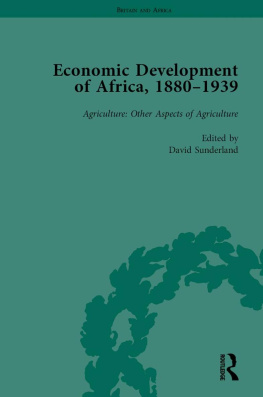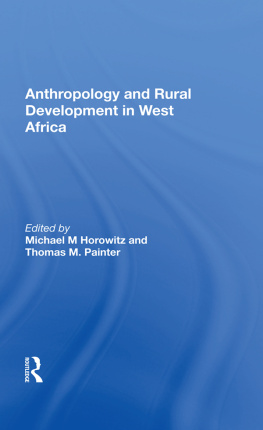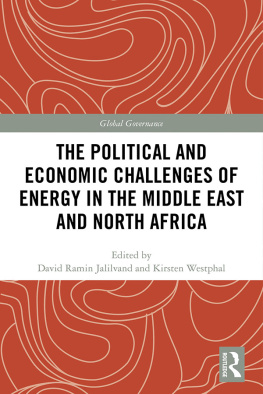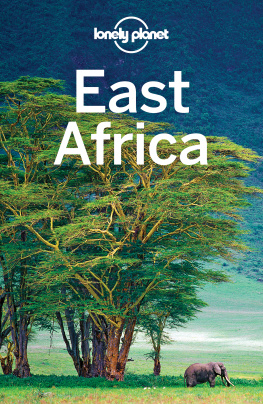Anthropology of Development and Change in East Africa
MONOGRAPHS IN DEVELOPMENT ANTHROPOLOGY
Under the General Editorship of DAVID W. BROKENSHA MICHAEL M HOROWITZ and THAYER SCUDDER
Sponsored by the Institute for Development Anthropology
Anthropology and Rural Development in West Africa, edited by Michael M Horowitz and Thomas M. Painter
Lands at Risk in the Third World: Local-Level Perspectives, edited by Peter D. Little and Michael M Horowitz, with A. Endre Nyerges
Anthropology of Development and Change in East Africa, edited by David W. Brokensha and Peter D. Little
Anthropology and Development in North Africa and the Middle East, edited by Muneera Salem-Murdock and Michael M Horowitz (forthcoming)
First published 1988 by Westview Press
Published 2018 by Routledge
52 Vanderbilt Avenue, New York, NY 10017
2 Park Square, Milton Park, Abingdon, Oxon OX14 4RN
Routledge is an imprint of the Taylor & Francis Group, an informa business
Copyright 1988 by Taylor & Francis
All rights reserved. No part of this book may be reprinted or reproduced or utilised in any form or by any electronic, mechanical, or other means, now known or hereafter invented, including photocopying and recording, or in any information storage or retrieval system, without permission in writing from the publishers.
Notice:
Product or corporate names may be trademarks or registered trademarks, and are used only for identification and explanation without intent to infringe.
Library of Congress Cataloging-in-Publication Data
Anthropology of development and change in East Africa/edited by
David W. Brokensha and Peter D. Little.
p. cm.(Monographs in development anthropology)
Bibliography: p.
Includes index.
ISBN 0-8133-7243-7
1. Economic development projectsAfrica, EastCase studies.
2. Agricultural development projectsAfrica, EastCase studies.
3. Community developmentAfrica, EastCase studies.
4. AnthropologyAfrica, East. I. Brokensha, David W. II. Little,
Peter D. III. Series.
HC860.Z9E443 1988
338.9676dc19
88-16917
CIP
ISBN 13: 978-0-367-01083-6 (hbk)
Contents
, Peter D. Little and David W. Brokensha
, Anita Spring
, Stephen G. Bunker
, Patrick Fleuret
, Anne Fleuret
, Joshua Akonga
, W. Thomas Conelly
, Angeliue Haugerud
, Benson C. Nindi
, Richard Hogg
, Edward H. Greeley
, Monica Udvardy
, Miriam S. Chaiken
Tables
Figures
Maps
East Africa
The editors are grateful for the editing and production assistance of a number of IDA staff members, especially Sylvia Horowitz, who copyedited the entire manuscript and supervised its transformation for computer-generated typesetting. Vivian Carlip gave a second editorial reading, Cecily ONeil helped with production, the manuscript was proofread by Vera Beers-Tyler, and Peter Daly designed the map on the following page.
To the contributors, of course, goes our greatest appreciation, for their gracious cooperation in making requested revisions as well as for the content of their work.
David W. Brokensha
Peter D. Little
Field Locations Described by Authors.
1. Anita Spring: Malawi (all); 2. Stephen Bunker: Bugisu District, Uganda; 3. Patrick Fleuret: Uganda (all); 4. Anne Fleuret: Taita/Taveta District, Coast Province, Kenya; 5. Joshua Akonga: Kitui District, Eastern Province, Kenya; 6. Thomas Conelly: Mbita Division, South Nyanza District, Kenya; 7. Angelique Haugerud: Rwanda (all); 8. Benson C. Nindi: Ismani, Iringa Region, Tanzania; 9. Richard Hogg: Turkana District, Kenya; 10. Edward H. Greeley: Meru District, Central Highlands, Kenya; 11. Monica Udvardy: Kaloleni Division, Coast Province, Kenya; and 12. Miriam S. Chaiken: Mbita Division, South Nyanza District, Kenya.
Source: From Premier World Atlas, Copyright 1978 by Rand McNally & Company, R.L. 88-S-61, p. 48. Reprinted with permission.
Peter D. Little and David W. Brokensha
Current discussions of development and change in East Africa are dominated by themes of stagnant agricultural production, ecological crisis, overextended state enterprise, and a worsening debt situation (Commins et al. 1986; Green 1985; Timberlake 1985). These premises, often only assumed to be accurate descriptions of reality, monopolize the policy dialogue among donor, government, and development planners and shape the development environment within which anthropologists currently work. This environment in certain respects differs from that of the 1970s, when the number of anthropologists involved in development activitieseither as consultants, researchers, or project managersincreased exponentially (cf. Hoben 1982). While continuities clearly exist, development anthropologists increasingly will have to be cognizant of the macroeconomic and larger institutional contexts within which rural development activities take place. Social soundness analysis, which has been the domain of the anthropologist, will have to be broadened to pay closer attention to linkages between local-level phenomena and the policy and institutional reforms that are taking place at national and international levels.
The realities of East Africa in the 1980s, a period marked by continued armed conflict and famine in certain countries, pose challenges to anthropology, and to development anthropology in particular. They challenge the very theories, methods, and practices of the discipline. What do anthropological method and theory have to say about institutional reform, food aid, agricultural price policy, and hunger (the last of which has received some attention from anthropologists: Scudder 1962 and Torry 1984)? What has been the experience of practicing anthropologists working in East Africa on development issues in the 1980s? How have the new development initiatives of the 1980s, which emphasize policy dialogue and sectoral programs, affected the work of anthropologists in the region? These and other questions with equally dramatic implications for local populations are addressed in this book.
The Book
This collection of twelve essays, while not representative of all development activities that concern anthropologists in East Africa, does illustrate several main themes. Some clearly represent new emphases in development anthropology in the regionfor example, analyses of decision making in regional and national institutions (P. Fleuret, Nindi), political and social assessments of state policies (Bunker, Hogg), and local effectiveness of national food aid programs (A. Fleuret)while others reflect continuity with earlier topics, although providing new data and different perspectives from earlier analyses. These include the role of anthropologists in agricultural research programs (Haugerud, Conelly, Spring), local response to drought and famine (Akonga), population and health programs (Chaiken, Greeley), and development of local organizations (Udvardy). All chapters are implicitly or explicitly related to at least one institution or agency, mostly governmental but including international donor agencies and nongovernmental organizations (NGOs).








